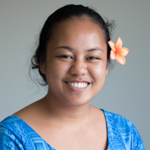Leota calls for coherence in regional frameworks
 By Soli Wilson
•
19 September 2019, 6:00PM
By Soli Wilson
•
19 September 2019, 6:00PM
The Director General of the Secretariat of the Pacific Regional Environment Programme (S.P.R.E.P.), Leota Kosi Latu, says coherence is needed for the many Pacific regional development frameworks.
“We have a number of existing frameworks but what we need to do is make sure that there is coherence in implementing those regional frameworks," he said.
"And that when we’re developing these next 2050 strategies, we need to ensure that there is strategic linkages to the 2050 strategy and that there is a logical coherence in terms of trying to connect all of that, otherwise it’s not going to make sense."
Leota made the point during the fourth Regional Energy and Transport Ministers Meeting chaired by the Minister of Finance, Sili Epa Tuioti. He was speaking during a high-level panel session facilitated by the Secretariat of the Pacific Community (S.P.C.)
According to Leota, developing frameworks is a good as a way forward but it comes with its own challenges.
“Can I also say that while it is nice to have these frameworks, what we are finding as a regional organization is that, we are finding that implementing regionalism whether it be through all these frameworks, it is quite costly," said Leota.
"And many of our entities are not resourced to actually implement these frameworks.
"We’re coming up with these great frameworks but there are no additional new resources to actually help us implement them and that’s something that I think we need to really think about."
The S.P.R.E.P. Director General also touched upon an issue that arose earlier in the year due to an oil spill in the region. On February 5, 2019, a Hong Kong bulk carrier spilled seventy five tonnes of oil in Solomon Islands.
An oil spill causes very serious environmental pollution and may damage society massively, impacting both daily activities and livelihoods.
"The issue is that, what we have discovered is many of our countries do not have proper legislation to properly address the issue of oil spill," said Leota.
"And not only that, many of our countries have not signed up to the relevant I.M.O. convention that enables them to have compensation and insurance.
"And I know we have I.M.O. colleagues present here in this meeting; and it is very important for us that if we are to seek compensation, not only do we need to have legislation but it is legislation that will implement and give effect to these I.M.O. conventions."
"What we have done in the region as a response to Marine spills is that we have now reviewed the Islands Regional Marine Spill Contingency Plan (P.A.C.P.L.A.N.).
"We are hoping that that will enable us to cover for a much more effective response to address this issue."
P.A.C.P.L.A.N. provides the framework for cooperative regional responses to major marine spills in the Pacific Islands region and sets out how Pacific island countries can request assistance from Australia, New Zealand, France or the U.S.
The fourth Regional Energy and Transport Ministers Meeting was opened by Prime Minister Tuilaepa Dr. Sa’ilele Malielegaoi.
He acknowledge the critical contributions of C.R.O.P. agencies for their ongoing commitment to “providing quality technical services, advisory advice and in particular the S.P.C. for the use of science for informed decision making as well as translating the science in a way that’s understandable to all people.”
 By Soli Wilson
•
19 September 2019, 6:00PM
By Soli Wilson
•
19 September 2019, 6:00PM







